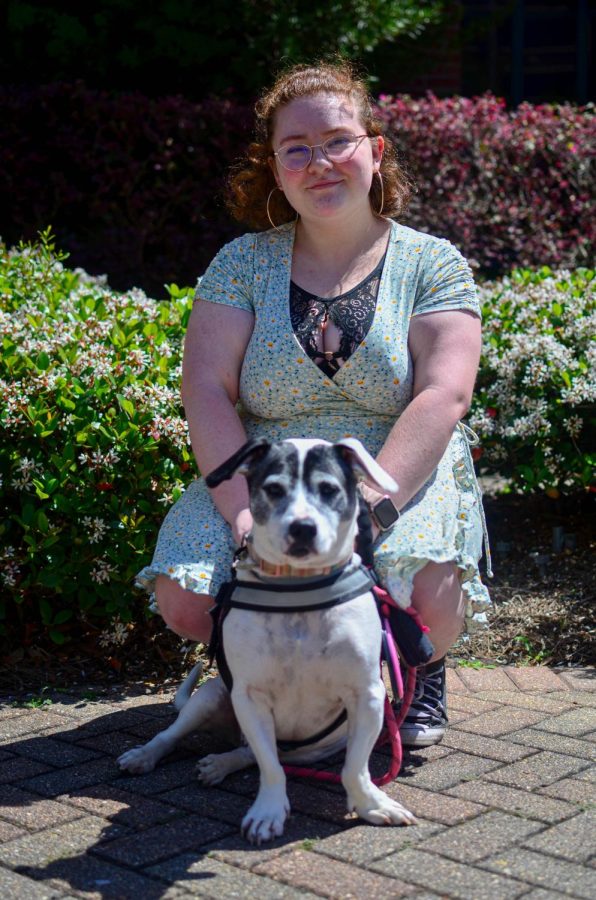Student, service dog face harassment
Ángel Seale sits with her service dog, Shiloh, in the Peace Quad, March 25, 2022. Seale said they’ve had problems with other students treating her and Shiloh poorly.
March 24, 2022
Ángel Seale said she was minding her own business, walking across campus with her service dog Shiloh one day when another student suddenly attacked him.
Seale, a music industry sophomore, said that the other student went out of her way to walk into Shiloh and hit him in the head with a metal water bottle, saying, “he was in my way.”
“I was just in shock,” Seale said. “I was just concerned about Shiloh, poor buddy.”
Seale said that she’d like to see the university provide more information about service animals, as this is not an isolated incident.
She also said that she has seen people act improperly in ways that, while not mean-spirited, are ignorant. Other students trying to pet Shiloh while he’s working, she said, is a common problem in her day-to-day life. She said that people not knowing how to act around service animals makes life harder for both her and Shiloh.
Shiloh is a psychiatric service dog who helps Seale with symptoms of anxiety related to autism. He is trained to perform a variety of tasks, including alerting his owner to the onset of a panic attack, stopping repetitive behavior, maintaining awareness of both of their surroundings, and relieving symptoms of anxiety or panic attacks.
Seale said that while this violent incident horrified her, it was far from the only example of poor treatment of her dog that she has experienced at Loyola. She said that they have rarely had problems with faculty or staff, but other students are a different story. While she is currently in the process of filing reports with the school and LUPD about this incident, which occurred early this semester, she said that she doesn’t expect it to do much to fix what she sees as a pattern of misconduct by other students.
“One time, a girl just came up to him and started to aggressively bark at him,” she said. “Why would you do that?”
“It would help if there was more accessible information about service dogs on campus because I know a lot of people have never seen a service dog before,” Seale said.
She said that she thinks it would help to have training for incoming students to inform them about disabilities and accommodations such as service dogs.
“We had all those panels during Wolf Pack Welcome, and it would have been really helpful if one was like, ‘You might see disabled people. Please don’t do weird things,’” she said.
She also said that it would be helpful to have a designated space in the library for people with service dogs and other disabled people.
Dario Bayardo, assistant director of the Office of Accessible Education, said that he is not sure exactly how many students at Loyola have service animals because people with service animals are not required to register their animals with the school in order to receive accommodations. Rather, service animals like Shiloh receive protections and rights under the Americans with Disabilities Act.
“Service animals should be treated as an extension of the person,” Bayardo said. “With very few exceptions, service animals can go wherever their owner goes and do whatever they need to do to fulfill their job.”
Bayardo said that he is not aware of significant problems with mistreatment of service animals on campus. However, he said that he hopes students with service animals who have bad experiences will continue to speak up so that changes can be made.
Bayardo said that the most important thing to keep in mind when you see a service animal is that it has a job and is most likely busy helping its owner. If you want to pet or talk to a service animal, you should talk to its owner and ask permission first.
Seale said that she doesn’t want others to feel like they have to tiptoe around service dogs or their owners—rather, she hopes people will be comfortable talking to owners and allowing service dogs to perform their jobs.
“People with service dogs are super approachable,” she said. “If you have a question, we’re more than willing to answer. We want to make service dogs seem more accessible and more normalized.”










Wendy Cook Wittmann • Mar 31, 2022 at 12:29 pm
I’m shocked that any person would hit or hurt a dog like those students did. What terrible people, truly.
Robby • May 4, 2023 at 1:08 pm
While my service K9 Ari, a mobility and psychiatric dog was going through training. She was approached by a father and toddler. The toddler kicked my dog and the father didn’t reprimand the child. This is a daily occurrence if I am not vigilant. It’s hard to keep people away. Regardless of the breed, type of harness, and education.
Lola • Mar 26, 2022 at 11:40 am
Yes, let’s set disability rights back 50 years by segregating us to a special area. Thanks, but NO. Maybe you should learn to advocate for yourself and your dog.